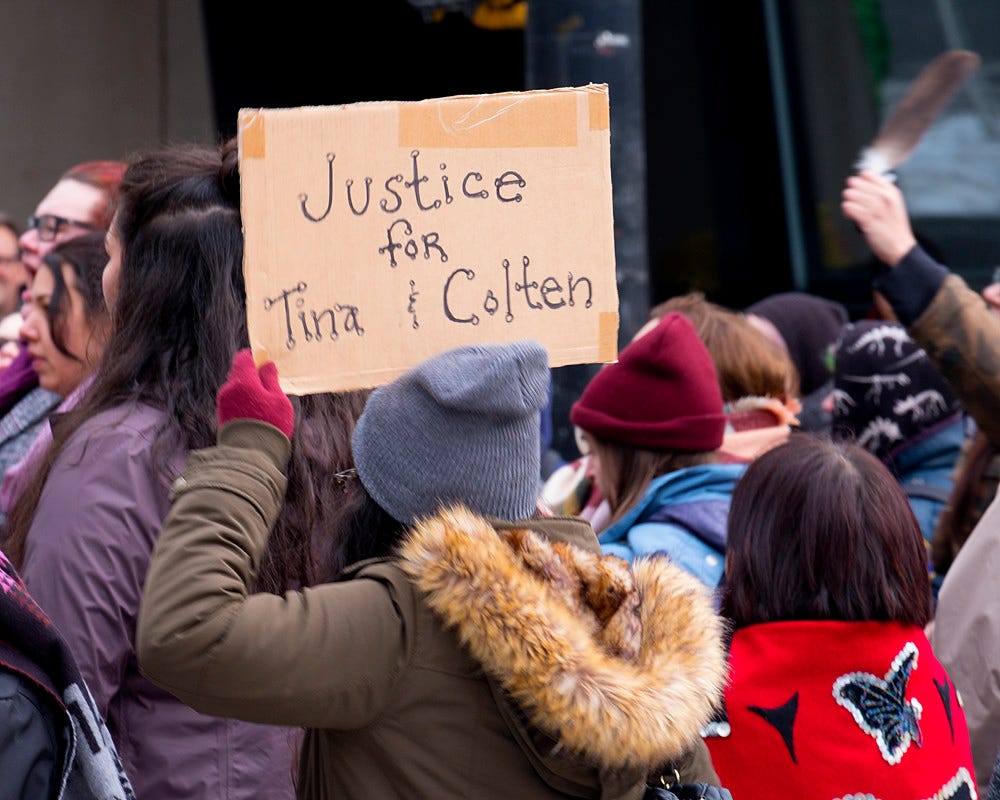I saw Colten Boushie's name in recent headlines. What happened?
A new report found that the RCMP destroyed records from the night Colten Boushie was killed and discriminated against his mother
Hey there, and welcome to the 24th issue of The Supplement, a newsletter that fills in the gaps of your other news intake. This is Sierra, one-third of the Supplement team!
Each week, we pick a question submitted by you, our readers. If you’d like to submit a question for a future week — it can seriously be about anything — then email us at thesupplementnewsletter@gmail.com. Befriend us on Instagram, and on Twitter. We don’t bite!
This week, we’re tackling this question: I saw Colten Boushie's name in recent headlines. What happened?
TL;DR: A new report by the Civilian Review and Complaints Commission found that the RCMP not only destroyed records from the night Colten Boushie was killed, but also racially discriminated against his mother while she was grieving. This is contrary to a 2017 report, in which the RCMP exonerated itself for the actions that took place following Boushie’s killing. Because the RCMP was created to control Indigenous peoples and their lands, it begs the question of if the force can ever truly reach a place of reconciliation that they say they are working towards.
An independent organization that investigates public complaints against the RCMP found some disturbing information about the night that Colten Boushie, a 22-year-old Cree man, was killed.
The Civilian Review and Complaints Commission (CRCC) found that not only did the RCMP destroy police records from the night that Boushie was killed, but they also treated Debbie Baptiste, Boushie’s mother, with extreme insensitivity that amounts to discrimination.
“The RCMP members’ actions included questioning Ms. Baptiste about her sobriety, smelling her breath, and looking inside her microwave to verify her statement that she had put her now-deceased son's dinner there,” reads the report.
The report also showed that officers surrounded the family home with weapons drawn, searched it unlawfully, and issued media releases that made Boushie appear criminal.
In August 2016, Boushie was shot in the back of the head by Saskatchewan farmer Gerald Stanley after entering his property with friends. Stanley has said he was trying to scare the Indigenous youth that he thought were stealing from him. An all-white jury acquitted Stanley of second-degree murder in 2018, prompting calls for reform in the Canadian criminal justice system.
In response to the CRCC report, RCMP Commissioner Brenda Lucki said her "objective is to transform the culture of the RCMP" and its relationship with Indigenous people.
The thing is, we knew the troubling details around the case back in 2016, and concerns were raised immediately. A Globe and Mail story published at the time walked us through the night that Boushie died, outlining his mother’s story. More recently, documentary filmmaker Tasha Hubbard made a documentary about the case called Nipawistamasowin: We Will Stand Up.
Notably, the RCMP assigned a senior investigator in 2017 to produce a report on the actions that took place following Boushie’s death, in which the RCMP exonerated itself. For example, the report says they sent officers to Baptiste's home "for officer and public safety."
The family then turned to the CRCC. When the organization requested records of police records from the night, they had been destroyed. The RCMP deemed them to have no evidentiary value.

“I refuse for my grandchildren to live in fear. In fear of the RCMP, of the justice system, that doesn’t exist for the Natives. Things need to change now. We’re tired of waiting,” Baptiste said at a news conference arranged by the Federation of Sovereign Indigenous Nations in Saskatoon.
As of March 23, Saskatchewan Premier Scott Moe said he has yet to read the full report. Prime Minister Justin Trudeau told reporters, “The way they (the family) were treated was unacceptable.”
But many think the government should be doing more. Back in 2018, Eleanore Sunchild, the Boushie family lawyer, called for the government to better tackle hate speech on social media, which has been rampant since Boushie’s death.

For now, we’ll leave you with some food for thought.
The RCMP was created to control Indigenous peoples and their lands, and to stop any opposition to the creation of a colonial state.
One report for the Missing and Murdered Indigenous Women and Girls (MMIWG) inquiry recommends decolonizing the justice system.


In particular, the MMIWG Final Report states Canada is committing race-based genocide against Indigenous women and girls — and Métis columnist Brandi Morin explains that the RCMP are contributors to that. Commissioners of the report have also said that the RCMP has not proven to Canada they’re capable of holding themselves to account. Just last year, Lucki was struggling to define systemic racism before acknowledging a few days later that it does exist in the force.
Here’s someone to follow:
This week, I suggest you follow the award-winning Rita Trichur of The Globe and Mail, a senior business writer and columnist. She got her first byline at age 6 when the Toronto Star published her short story about a fish-stealing cat and paid her $10. And she provides some pretty good curation for your Twitter feed.
Here’s a story to check out:
In continuation from the topic this week, Brandi Morin wrote a deeply moving story about Indigenous people who were killed by police in Canada and the loved ones they left behind. She covers the stories of individuals like Chantel Moore, Rodney Levi, Neil Stonechild and more. As a Canadian, you should know their names, histories and families.






